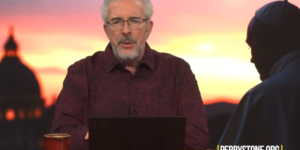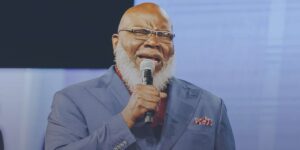Apologist Dismisses Biblical Critics’ Claims, Details Proof tor the Virgin Birth
Read Time: 3 Minutes 30 Seconds
Jason Jimenez, an apologist and host of the “Challenging Conversations” podcast, recently commenced an episode of his show with a fascinating question: How many of you believe in the virgin birth?
It’s an essential inquiry in an era hyper-focused on the material and the self—and one obviously worth pondering during the Christmas season. Apologists like Jimenez also believe this is especially important to tackle during a time when secularism rages and progressive ideologies dismiss basic biblical tenets.
In laying out compelling evidence, Jimenez contended, despite increased skepticism in some circles, the gospel narrative “is credible” and people “can trust the virgin birth story,” pointing to Scripture, dating and other key research to make his appeals.
“You can put your faith and trust in the evidence that we have surrounding it,” he said.
Jimenez contended belief in the virgin birth is an “essential doctrine of the Christian faith,” explaining how the incarnation—Christ’s coming in human form—forms the basis of the gospel narrative.
When it comes to these beliefs, Jimenez said people today are left with two options: understand the authenticity of these sentiments or throw them out entirely. And he detailed some of the “liberal-minded scholars” who have opted for the latter, attempting to explain why their views skirt the facts.
“If you are a biblical Christian … you believe that Jesus Christ came and died on the cross for [your] sins, we believe that He perfectly came in the form of a human being,” Jimenez said. “That He is the God-man, fully God and fully man.”
He specifically pointed to Matthew and Luke, who explore Jesus’ birth in stunning fashion in the Scriptures and detailed some of the dates he believes are essential to understanding the virgin birth and the overarching authenticity of the Bible.
While Jimenez said people will often claim the virgin birth is folklore or a copycat story that evolved over time, he rejected those arguments and explained how the Gospels were written early on during a time when eyewitnesses who saw Jesus’ life, death and resurrection were still living.
“Mark is the earliest and first Gospel,” he said, noting the Gospel came to formation not long after Jesus’ life, death and resurrection. “The date that Mark was writing…was in the early 50s.”
Matthew also wrote his Gospel in the mid-50s, with Luke coming in the late 50s or early 60s with his biblical account.
“Do you realize how early we have on record that the Gospels were written within [the content of] eyewitnesses who are still alive, who actually bore claims to the truth that Jesus Christ came into this world through the Virgin Mary?” he asked.
Church fathers also affirmed the virgin birth, which Jimenez extensively detailed, explaining how many of these early leaders refuted dismissals of the virgin birth and repeatedly affirmed it.
“We have early documentation within the canonical Gospels, and the other thing is we see clearly here: we have church fathers who are articulating [the virgin birth],” he said. “Not only do we have early accounts of the virgin birth story in the canonical Gospels prior to any other writings that clearly … does not bear true or copy any form of paganism, but actually quite the opposite.”
Jimenez noted how Luke 1:1-4 (NIV) specifically references eyewitnesses and Luke’s own investigation into Jesus’ life and birth. During a time when some of these eyewitnesses were still alive, lying about the details or embellishing them would have certainly had cultural consequences.
“Many have undertaken to draw up an account of the things that have been fulfilled among us, just as they were handed down to us by those who from the first were eyewitnesses and servants of the word,” Luke wrote. “With this in mind, since I myself have carefully investigated everything from the beginning, I too decided to write an orderly account for you, most excellent Theophilus, so that you may know the certainty of the things you have been taught.”
In light of all of this, Jimenez explained why a belief in the virgin birth is so essential to Christianity.
“If you don’t believe in a literal virgin birth … and you don’t believe that [Jesus] was born in a special way, then that opens a door for you … to deny other literal claims, like He literally was the God-man, fully God, fully man, that He literally fulfilled prophecy, that He literally died on the cross [for your] sins, that He literally was buried and that He literally rose again, that He will literally return again,” he said.
Listen to Jimenez break down evidence he believes will not only help build up Christians’ faith, but also equip believers to engage skeptics who question the virgin birth and Jesus’ birth narrative. {eoa}
This story originally appeared on Faithwire.com.
Bring Charisma magazine home with a subscription today!






































